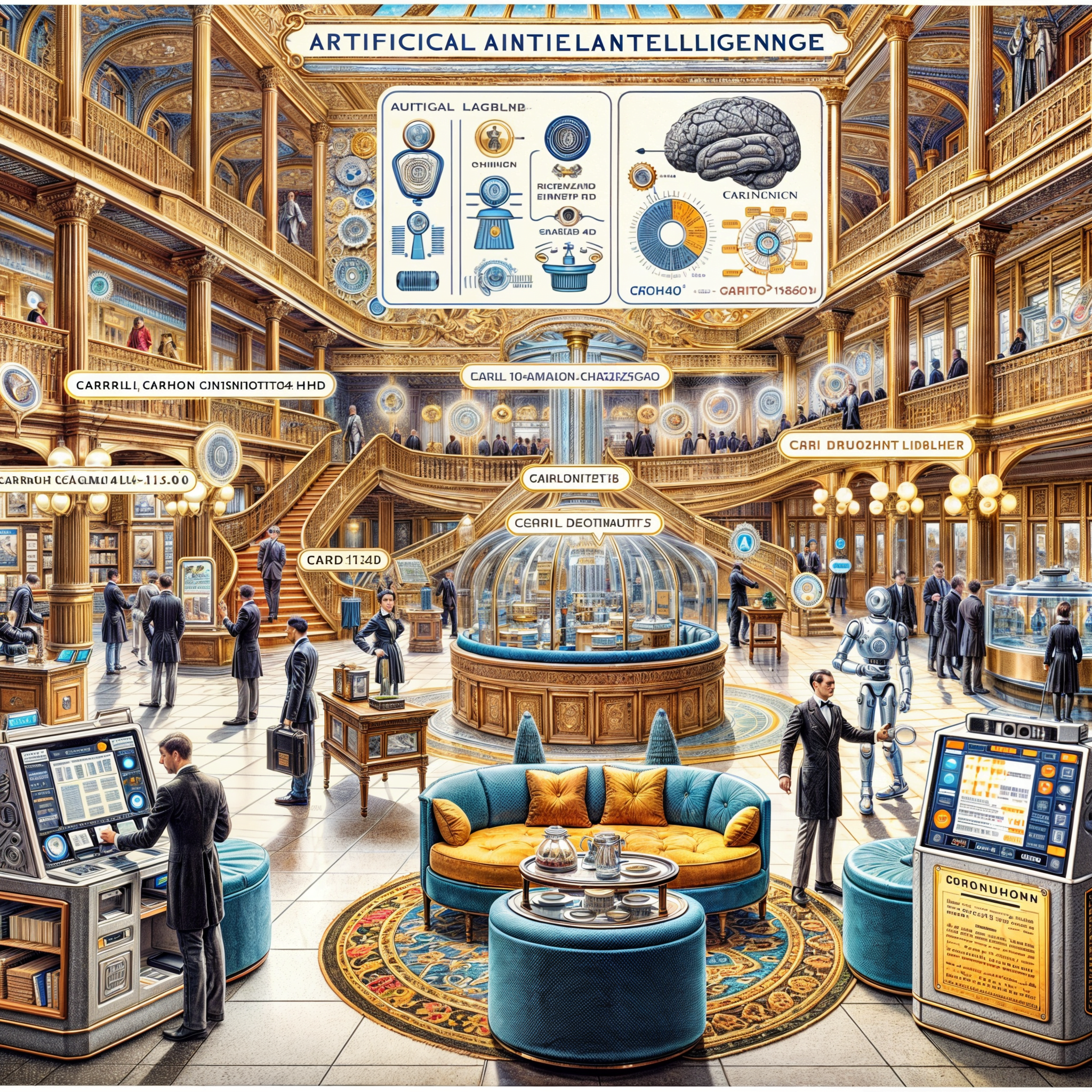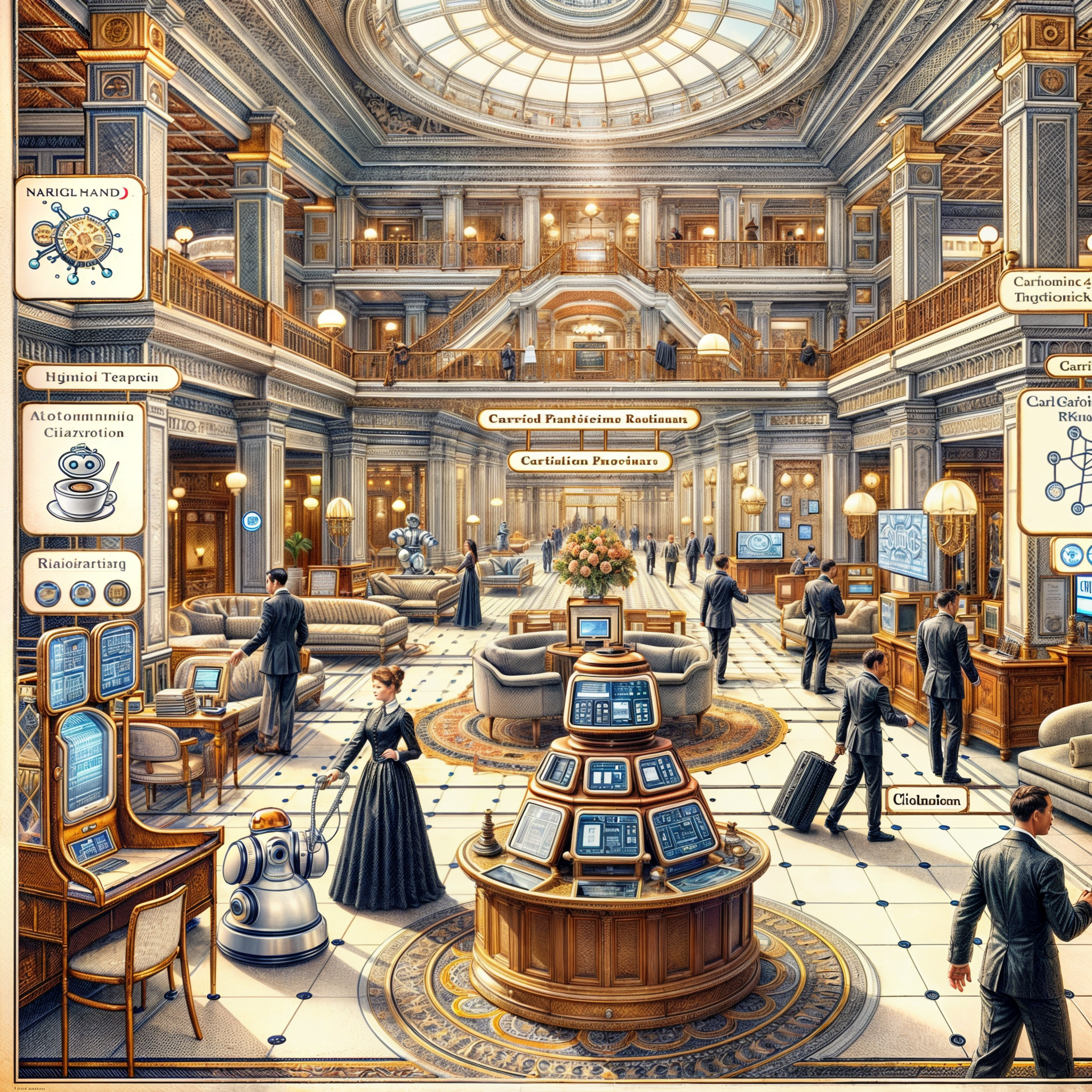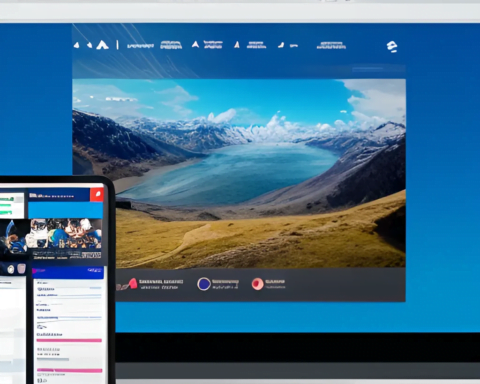Last Updated on March 1, 2024 9:47 pm by Laszlo Szabo / NowadAIs | Published on March 1, 2024 by Laszlo Szabo / NowadAIs
AI in Hospitality Industry – Artificial Intelligence in Hotel Industry – Key Notes
- AI is significantly enhancing operational efficiency and decision-making in the hospitality industry.
- The integration of machine learning and natural language processing is crucial for personalizing guest experiences and streamlining hotel operations.
- AI’s applications in the hospitality industry include improving customer service, enhancing security protocols, and contributing to sustainability efforts.
- The growing necessity of AI in hospitality focuses on managing guest experience, operational efficiency, and ensuring data security and privacy.
- AI-driven customer support and communication are revolutionizing hotel interactions with guests, offering 24/7 availability and multilingual support.
Artificial Intelligence Changes Hotel Industry
Artificial intelligence (AI) is redefining the hospitality industry, offering groundbreaking opportunities for innovation and service enhancement. The integration of AI technologies, such as machine learning and natural language processing, is propelling businesses toward unprecedented operational efficiency and decision-making prowess.
With the travel and hospitality AI market anticipated to exceed $1.2 billion by 2026, the importance of AI in hospitality cannot be overstated.
This transformative wave brings forth applications designed to personalize guest experiences, streamline hotel operations, deliver intelligent customer service, and strengthen security protocols.
Consequently, exploring AI’s potential has become a crucial endeavor for industry leaders who are keen on maintaining the competitive edge in this dynamic sector.
This article will delve into the growing necessity of AI in the hospitality industry, examining how it can drastically improve experience for guests while simultaneously optimizing efficiency in hotel chain operations.
It will discuss the practical applications of AI, from offering personalized recommendations to ensuring data security and privacy. Additionally, the exploration will touch on the significance of AI-powered customer support and the visionary future it holds for hospitality.
For businesses considering taking their first steps into adopting AI, the article will provide insights into initial implementation strategies.
By encompassing the various dimensions AI presents to hospitality, readers will garner a comprehensive understanding of both its current influence and its emerging potential to shape the industry’s future.
The Growing Need for AI in the Hospitality Industry
The hospitality industry is embracing AI to meet the evolving needs of guests and to stay ahead in a competitive market.
Here’s why the demand for AI in hospitality is growing:
- Guest Experience Management: AI technologies like machine learning and natural language processing are key to offering personalized guest interactions and streamlining smart hotel operations. By analyzing guest data, AI can also tailor experiences to individual preferences, enhancing satisfaction and loyalty. For instance, AI-powered chatbots and virtual assistants provide real-time assistance and recommendations, making the guest’s stay more enjoyable and convenient.
- Operational Efficiency: Automating routine tasks such as booking, check-in/check-out processes, and housekeeping with AI allows staff to dedicate more time to personalized service. This not only improves the guest experience but also boosts operational productivity. Additionally, AI algorithms can predict market trends, aiding hotels in optimizing inventory levels, adjusting room prices, and enhancing logistics, which is critical for maintaining a competitive edge.
- Data-Driven Personalization: The ability of AI to analyze large datasets and extract valuable insights is a game-changer. Hotels can offer highly personalized recommendations and services to guests, going beyond one-size-fits-all solutions. This data-driven approach helps in crafting unique experiences that resonate with guests, fostering a sense of exclusivity and attention to detail.
- Quality and Safety Standards: AI-powered systems uphold the highest standards in supply chain management by monitoring and analyzing quality parameters. In the realm of food safety, AI enhances regulatory compliance by detecting contaminants or spoilage in real-time, thus boosting consumer trust and brand reputation.
- Sustainability Efforts: Smart building systems optimized by AI contribute significantly to energy efficiency within the hotels. This not only reduces costs but also aligns with the growing trend of sustainability in the hospitality industry, appealing to eco-conscious travelers and reinforcing the hotel’s commitment to environmental stewardship.
The integration of AI in the hospitality industry is not just a trend; it’s a strategic move to cater to the modern traveler’s expectations and to ensure the longevity and profitability of hospitality brands.
With the travel and hospitality AI market projected to surpass $1.2 billion by 2026, the investment in AI technologies signifies a technology leader’s foresight in the hospitality area.
This adoption of AI positions hotels to deliver exceptional customer experiences and to operate with unparalleled efficiency, ultimately contributing to a robust bottom line.
Enhancing the Guest Experience with AI Tools in the Hotel Industry
Artificial Intelligence is revolutionizing the hospitality industry, particularly in enhancing the guest experience.
Here are some of the ways AI is already making a significant impact:
- Personalization and Customization: AI-driven technologies, such as machine learning and natural language processing, are pivotal in providing guests with tailored services. By analyzing guest data, AI can offer personalized recommendations and customized experiences, ensuring each guest feels uniquely valued. For example, room service and lookout customization can be adjusted based on guest preferences for mattress firmness, lighting, and temperature, making their stay more comfortable and memorable.
- 24/7 Customer Support: AI-powered chatbots and virtual assistants are enhancing customer service by providing instant responses to guest inquiries. These AI tools are available around the clock, handling reservations, FAQs, and guest requests, thereby improving interaction with quick and efficient responses. This constant availability is particularly beneficial for international guests, as chatbots can recognize languages and translate inquiries in real-time, breaking down communication barriers.
- Streamlined Operations: AI not only personalizes the guest experience but also streamlines hotel operations. AI-powered mobile apps and robots can guide guests through their journey, from a seamless check-in process to providing recommendations based on their preferences. This reduces labor costs and enhances operational efficiency, as AI models the concierge experience, offering personalized interactions and guidance without the need for additional staff.
Incorporating AI in the hospitality industry is not just about adopting new technology; it’s about reshaping the entire guest experience to be more personalized, efficient, and satisfying. With AI, hotels can ensure that guests receive a high level of service that is both modern and responsive to their individual needs.
Use Artificial Intelligence to Streamlining Operations and Improving Efficiency

Artificial intelligence (AI) is transforming the hospitality industry by enhancing operational efficiency in several key areas:
- Streamlined Booking and Guest Interaction: AI simplifies the booking process by providing instant responses and assistance with reservations, leading to a more fluid interaction with guests. This efficiency is vital for maintaining a high level of customer service and satisfaction.
- Data-Driven Personalization: By analyzing extensive data sets, AI algorithms offer personalized experiences that cater to individual guest preferences. This not only improves the guest experience but also leads to cost savings by optimizing services to meet specific needs.
- Operational Process Optimization: AI-powered systems are adept at identifying bottlenecks and areas needing improvement by analyzing data from various sources. This allows for better allocation of resources and minimized time and effort in daily operations.
- Task Assignment and Workload Management: Through AI algorithms, tasks can be assigned by assessing staff availability and skills, ensuring balanced workloads and reducing the chance of bottlenecks in operations.
- Predictive Analytics for Proactive Strategy: Predictive analytics tools forecast trends and guest behaviors, allowing hotels to adapt strategies proactively, which is essential for staying ahead in a competitive market.
- Revenue Management and Error Reduction: AI technologies help in managing revenue by automating tasks that are prone to human error, thus increasing overall efficiency.
- Sustainability and Waste Management: AI optimizes back-of-house operations such as managing waste and energy usage, contributing to sustainability efforts and cost reduction.
- Robotics in Service Delivery: AI-integrated robots can perform various tasks, enhancing customer experiences while ensuring safety standards are met.
- Customer Support Efficiency: AI chatbots can significantly reduce call handle time, decrease call abandonment rates, and save thousands of agent hours annually, translating to substantial cost savings.
- Internal Productivity: Expanding chatbot usage to internal teams like HR and IT can boost productivity, and integrating these systems with back-end operations can enhance personalization for guests.
- Comprehensive Operational Effectiveness: AI solutions collate data from all hotel departments to anticipate guests’ needs and streamline operations, leading to a more efficient and guest-centric approach.
- Supply Chain and Inventory Management: AI can help monitor food purchases and consumption rates, preventing waste and ensuring that ingredients are always available for guests’ needs.
The implementation of AI in the hospitality industry is not just about technological advancement; it’s about reimagining the entire operational framework to be more efficient, guest-focused, and sustainable.
As AI continues to evolve, the potential for further streamlining operations and improving efficiency in the hospitality industry is immense, offering exciting opportunities for hospitality brands to innovate and thrive.
For instance, AI chatbots have demonstrated their value by achieving a 28% reduction in average call handle time, which not only improves customer service but also contributes to significant annual cost savings.
This efficiency is further enhanced when AI tools are used across various departments, from front-of-house interactions to back-end management, ensuring a cohesive and streamlined operation that resonates with the needs of the modern traveler.
In conclusion, the adoption of AI in the hospitality industry signals a commitment to innovation, efficiency, and an enhanced guest experience.
By leveraging AI’s capabilities, hotels can optimize their operations, reduce costs, and provide services that meet the high standards expected by today’s consumers.
Personalized Recommendations and Services within Hospitality Business
Artificial intelligence is transforming the hospitality industry by enabling personalized recommendations and services that cater to the unique preferences and expectations of each guest.
This personalized approach is not just about making guests feel special; it’s about leveraging AI-driven insights to deliver a more tailored and satisfying experience. Here’s how AI is making this possible:
- Comprehensive Guest Profiling: AI systems process vast amounts of data to create detailed guest profiles. This includes information such as booking history, room preferences, dietary restrictions, and feedback, which is used to anticipate needs and personalize the guest experience. For instance, if a guest frequently requests extra pillows, AI can ensure that this preference is noted and acted upon in future stays.
- Predictive Analytics for Anticipating Needs: Predictive analytics uses past behavior to anticipate guest preferences, such as pre-scheduling a spa appointment or suggesting a favorite wine. This proactive approach to guest services ensures a seamless experience from check-in to check-out, with AI systems making intelligent recommendations based on previous interactions.
- Dynamic Personalization and Pricing: AI enables hotels to offer personalized pricing and promotions tailored to individual guests. By analyzing a guest’s past behavior and demographics, AI can create offers that are more likely to be accepted, such as room upgrades or special packages, enhancing the overall value proposition for the guest.
- Sentiment Analysis for Service Improvement: AI’s sentiment analysis tools monitor social media and review platforms to gauge customer responses to specific features or services. This feedback is invaluable for hotels to address common complaints, improve positive aspects, and adjust services to better meet guest expectations.
By implementing AI-driven personalization, hotels can ensure that their services are not just meeting but exceeding guest expectations. The use of AI in the hospitality industry is a testament to how technology can enhance the human aspect of customer service, making every guest’s stay a unique and memorable experience.
With AI, the possibilities for personalization are vast, promising a future where hospitality is not only about a place to stay but a tailored journey for every traveler.
For more insights on how AI-driven personalization is reshaping the hospitality industry, explore the latest strategies in personalizing hotel services and discover the impact of AI in hospitality.
Ensuring Data Security and Privacy in Hotel Operations
In the ai in hospitality industry, ensuring data security and privacy is paramount, as it directly impacts guest trust and brand reputation. Here are the key measures hotels are implementing:
- Facial Recognition and AI Surveillance: Advanced AI contributes to the safety and security of hotels through facial recognition technology and AI-driven surveillance systems. These tools are crucial in identifying authorized personnel and guests, thus preventing unauthorized access and enhancing overall security.
- AI-Driven Threat Detection: AI-powered surveillance systems play a pivotal role in identifying potential security threats. They alert staff in real-time, allowing for swift action to ensure guest safety and maintain a secure environment.
- Encryption and Authentication: To protect guest information, AI hospitality solutions incorporate additional layers of security such as encryption and authentication protocols. These measures are essential in maintaining the confidentiality of guest data and preventing unauthorized access. Hotels leveraging these technologies, as outlined in a Hospitality Tech article, demonstrate a strong commitment to data security.
- Transparent Data Policies: It is crucial for hotels to clearly communicate their data privacy policies. Guests should be informed about how their data is used and must be provided with options for data deletion or correction. Compliance with relevant data protection regulations is not only a legal requirement but also a foundation for building guest trust.
- Compliance with Privacy Standards: Surveillance systems like those from Avigilon and Deep Sentinel enhance guest safety while adhering to privacy standards. These systems are designed to prevent and manage incidents effectively, providing valuable data for security decisions without compromising privacy, as noted by TrustYou.
- Proactive Guest Service: Beyond monitoring for threats, AI in the hospitality industry also proactively offers services and amenities to guests, ensuring their stay is not only secure but also comfortable and enjoyable.
By integrating these security measures, the ai hospitality industry can effectively address privacy concerns while harnessing the benefits of AI for improved guest experiences.
Benefits of AI in Customer Support and Communication in Hospitality Management
In the ai in hospitality industry, AI-powered customer support and communication are revolutionizing the way hotels interact with guests. Here’s how these technologies are enhancing the guest experience:
- 24/7 Availability: AI chatbots and virtual assistants are readily available around the clock, providing guests with immediate assistance and information regarding their inquiries, reservations, and hotel facilities. This constant availability ensures guests have access to support whenever they need it, contributing to a seamless and stress-free experience. For example, GrandStay Hotels saw a significant improvement in first call resolution and a decrease in social media complaints after implementing a balanced approach of chatbot automation with a human touch.
- Multilingual Support: With the capability to recognize and translate multiple languages, AI chatbots break down language barriers, offering improved communication with international guests. This feature is particularly beneficial for hotels with a diverse clientele, ensuring that guests receive support in their preferred language.
- Efficiency in Repetitive Tasks: Chatbots excel at managing repetitive tasks and can be integrated across various communication channels like the hotel’s website, mobile app, Facebook Messenger, and SMS. This integration ensures that no matter how a guest chooses to communicate, they receive consistent and efficient service. Continuous improvement and testing of these AI systems are crucial to maintain a seamless user experience, as highlighted by industry leaders who have explored advanced technologies like speech recognition to further enhance chatbot capabilities.
To maximize the return on investment, it’s important to align AI chatbot use cases with guest pain points, deploy across multiple channels, and ensure integration with backend systems.
Monitoring conversation logs, containment rates, user sentiment, and usage metrics post-launch can provide valuable insights for further improvements. Hotels looking to implement chatbot solutions can consider platforms such as Chatfuel, Watson Assistant, Pandorabots, Motion.ai, Snatchbot, and Botngage for their AI customer support needs.
By utilizing AI in customer support and communication, hotels in the hospitality industry can provide a higher level of customer service that is personalized, efficient, and responsive to the needs of their guests.
This not only enhances the guest experience but also positions hospitality brands as technology leaders in the market.
The Future of Artificial Intelligence in the Hospitality Industry
- Economic Growth and AI: The ai in hospitality industry is on the brink of a transformative leap, with AI’s potential to double annual economic growth rates by 2035. This technological advancement is expected to add a staggering $15.7 trillion to the global economy by 2030. However, this growth does come with the caveat of potential job displacement due to automation, highlighting the need for a balanced approach to AI integration.
- Robotic Automation in Food Service: AI-driven robotics are set to revolutionize food preparation in the hospitality industry, particularly in restaurants. These robots ensure consistency and speed, which are paramount in delivering quality customer service. While they take over repetitive tasks, human workers can focus on creative aspects of food service and hospitality, adding a personal touch that AI cannot replicate.
- Unforgettable Travel Experiences: AI-driven solutions are poised to revolutionize travel, making every aspect of a journey not just memorable but truly unforgettable. From virtual assistants that provide real-time, personalized travel advice to AI-powered room customization that anticipates a guest’s preferences, the aim is to create an unparalleled guest experience that is both seamless and deeply personal.
- Balancing AI and Human Interaction: It is essential to maintain a balance between AI use and human interaction within the hospitality industry. Personalization, a cornerstone of hospitality, can be enhanced with AI, but the human touch remains irreplaceable for genuine connections and upholding data confidentiality. This balance ensures that while AI can optimize operational aspects such as pricing and revenue management, the essence of hospitality remains intact.
- AI in Marketing and Revenue Management: Predictive modeling and data analysis through AI can optimize pricing and revenue management, leading to more effective marketing strategies. AI marketing campaigns that use predictive analytics to forecast customer behavior and market trends can result in more targeted and successful promotions, enhancing both the guest experience and the brand’s bottom line.
- Empowering Human Creativity: As AI takes over routine tasks, human workers in the hospitality industry are freed to invest their creativity into their roles. This shift not only enhances the guest experience through more personalized interactions but also improves the quality of life for employees, enabling them to spend more time with family and loved ones.
For a deeper understanding of AI’s impact on economic growth, see this comprehensive guide on AI for hospitality executives. Meanwhile, to explore the balance between AI and human interaction in the hospitality vertical, consider the insights from industry experts.
Getting Started with AI in Hospitality – Use AI Platforms
Embarking on the journey of integrating AI into your hotel’s operations can be a game-changer for enhancing efficiency and guest satisfaction.
Here are the preliminary steps to get started:
- Assess AI Readiness: Before diving into AI, assess your hotel’s readiness for such technology. This involves evaluating your current systems and determining how AI can align with your business objectives. Consider factors like existing digital infrastructure, staff tech-savviness, and the specific needs that AI could address in your operations.
- Identify Integration Areas: Look for areas in your hotel operations where AI could have the greatest impact. This might include customer service, supply chain management, or dynamic pricing strategies. By focusing on these areas, you can create a targeted approach that maximizes the benefits of AI.
- Build an AI Integration Team: Assemble a team dedicated to AI integration. This team should include staff members who are knowledgeable about your hotel’s operations, as well as those who are tech-savvy. Together, they will spearhead the integration process and ensure that the technology is used effectively.
- Develop a Training Program: AI technology is only as good as the people using it. Develop a specialized training program for your team to ensure they are equipped to work with the new systems. This will foster a culture of innovation and adaptability, which is crucial for successful AI integration.
- Set Clear Goals and a Timeline: Create a detailed plan that includes specific goals for your AI integration, a realistic timeline, and preparation steps. This plan should also outline potential risks and ensure compliance with all legal requirements related to data security and privacy.
- Monitor and Evaluate: Once your AI systems are in place, regularly monitor and evaluate their performance using clear metrics. Be prepared to make iterative improvements based on data and feedback. If a particular AI solution proves to be successful, consider scaling it to other areas of your operations.
By following these steps and utilizing the resources available, such as the step-by-step guide to implementing AI in your hotel, you can navigate the complexities of AI integration with confidence.
This strategic approach will allow you to harness the full potential of artificial intelligence in the hospitality industry, paving the way for a more efficient, personalized, and competitive service offering.
Conclusion – Generative AI Transforming the Hospitality Industry
Reflecting on the transformative role of AI in the hospitality industry illuminates a future where personalized guest experiences and operational efficiency redefine the standards of service excellence.
By harnessing the power of AI, hotels can deliver a level of customization that not only meets but anticipates the diverse needs of every traveler. The practical implications of this technological integration extend beyond immediate convenience, suggesting a long-term impact on the industry’s evolution in customer satisfaction and business performance.
In embracing the pioneering spirit of AI, hoteliers are invited to chart a new course towards innovation and growth—fortifying their commitment to creating unforgettable guest experiences while streamlining their operations.
For those poised to take this leap, the resources are ready to guide your journey and enhance your establishment’s offerings; discover how AI can revolutionize your hotel’s operations and guest services by exploring tailored AI solutions for the hospitality sector.
Definitions
- Hospitality: The relationship between a guest and a host, where the host receives the guest with goodwill, including the reception and entertainment of guests, visitors, or strangers.
- Artificial Intelligence (AI): A branch of computer science dealing with the simulation of intelligent behavior in computers, enabling them to perform tasks that normally require human intelligence, such as visual perception, speech recognition, decision-making, and language translation.
- Machine Learning: A subset of AI that involves the use of data and algorithms to imitate the way that humans learn, gradually improving its accuracy.
- Natural Language Processing (NLP): An area of AI focused on the interaction between computers and humans through natural language, enabling computers to understand, interpret, and generate human language in a valuable way.
Frequently Asked Questions
- What benefits does AI offer to the hospitality industry?
- AI enhances guest experiences through personalization, improves operational efficiency, and supports data security and privacy.
- How does AI improve guest experiences in the hospitality industry?
- Through personalized recommendations, 24/7 customer support, and customized services tailored to individual guest preferences.
- What role does machine learning play in AI in the hospitality industry?
- Machine learning analyzes guest data to tailor experiences and improve service offerings based on individual preferences.
- Can AI in the hospitality industry improve operational efficiency?
- Yes, by automating routine tasks, optimizing resource allocation, and providing predictive analytics for proactive strategy adjustments.
- How does AI contribute to sustainability in the hospitality industry?
- AI-powered smart building systems optimize energy use, contributing to cost reduction and environmental stewardship.
- What challenges are associated with implementing AI in the hospitality industry?
- Challenges include the initial investment cost, the need for staff training, and ensuring the privacy and security of guest data.
- How does AI in the hospitality industry ensure data security and privacy?
- By incorporating advanced security measures such as encryption, authentication, and compliance with privacy standards.
- What future developments can we expect from AI in the hospitality industry?
- Expect further advancements in personalized guest services, operational efficiency, and the integration of AI with human creativity.
- Is AI in the hospitality industry accessible to all sizes of hotels?
- While initially more accessible to larger chains, scalable AI solutions are becoming increasingly available for smaller establishments.
- How can hotels get started with integrating AI in their operations?
- Hotels should assess their AI readiness, identify key integration areas, and develop a strategic implementation plan with clear goals.












